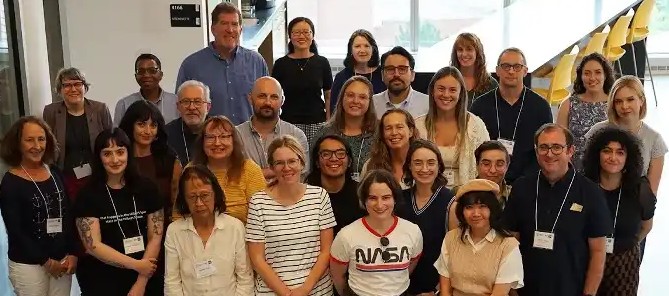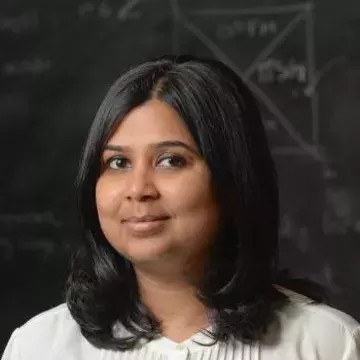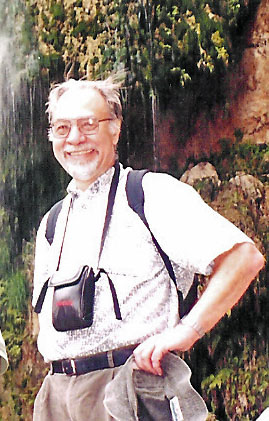Driving AI Innovation for Autonomous Vehicles
- Details
- Category: Department News
- Published: Wednesday, August 27 2025 01:40
When John Wyrwas gets behind the wheel, he doesn’t just think about where he’s going or how to get there; he also thinks about something else: what kind of information would a car need to have if artificial intelligence-embodied software were doing the driving?
“I sometimes stop to ask myself, ‘Is the way I'm driving going to be good training data for our AI or am I doing something that, if I tried to teach the machine this, I wouldn’t be happy with the outcome?’” Wyrwas said. John Wyrwas
John Wyrwas
For years, Wyrwas has been working with self-driving systems for everything from semi-trucks to passenger cars, leveraging technologies like robotics and artificial intelligence to make autonomous vehicles smarter and safer. In his current role at Wayve, Wyrwas leads the AI Evaluation software engineering division for AI Driver, Wayve’s next-generation automated driving system. It’s an intuitive end-to-end deep learning platform that integrates advanced AI into vehicles, transforming the way they predict, perceive, and learn from human behavior in real-world environments.
“So many companies in this autonomous vehicle space see this primarily as an engineering problem, but Wayve has been pushing this idea of embodied AI that relies on a machine learning-first approach,” Wyrwas explained. “I'm proud to be part of a team that is pioneering this space, taking an approach that spans software, hardware, and machine learning. We need to innovate on all those fronts to be successful.”
Driving with data
Designed to be compatible with any type of vehicle, Wayve’s automated system learns to drive using a broad spectrum of real-world data, converting and applying this data to equip vehicles with human-like driving capabilities. Wyrwas’s team puts that innovation to the test, evaluating Wayve’s AI-driven system over a wide array of simulated driving scenarios to measure its adaptability in dynamic environments.
“The amazing thing about using the AI approach to autonomous development is its remarkable generalizability,” Wyrwas noted. “Recently, we had a global roadshow, 90 cities in 90 days, and our AI model navigated a wide variety of urban and rural highway settings across Europe, North America and Japan using a single AI model. This is unique because with more of a robotics-first development approach, you would spend months or years tuning the software and the rules to work in those locations—we can do it much more quickly with data.”
Wyrwas sees a world of possibilities on the road ahead.
“Every week when I go out on our development vehicles at Wayve, I'm always thrilled when we're doing better at performance, safety and comfort in the vehicle,” he said. “If we can get them in the hands of everyday people, it's really going to open up more quality-of-life opportunities for everyone.”
A fascination with physics
Growing up in Anne Arundel County, Md., Wyrwas was always curious about how things worked in the world around him. A memorable high school class sparked his interest in physics.
“I recall the first day of class, the teacher had a bowling ball hanging from the ceiling, and asked us, ‘How does this work?” Wyrwas recalled. “He pushed it, and it swung like a pendulum, and we dove right into trying to understand how things move in the real world. That made physics very compelling to me.”
A few years later, Wyrwas began college at the University of Maryland as an electrical engineering major, but by the time he was halfway through freshman year, memories of his high school physics experience and a class with Distinguished University Professor of Physics S. James Gates Jr. inspired him to explore physics further.
“I was very eager to take Dr. Gates' introductory physics sequence, which was known for its more in-depth approach to foundational topics because I had a big desire to understand how the world works, not just at the applied level, but at that fundamental level as well,” Wyrwas recalled. “Engineering could teach me how to build, but physics could also teach me how to think more deeply and abstractly about the world. I signed up for a dual-degree program in physics and electrical engineering and never regretted it.”
A summer research program in the late Physics Professor Bob Anderson’s lab took Wyrwas’ fascination with physics to the next level, introducing him to the challenges of quantum.
“In quantum computing, what was interesting to me was the discovery process. It was so different from my classes where everything was figured out,” Wyrwas explained. “Here we didn't always know the next step or what we were going to see in the next experiment, and that discovery process was very compelling to me.”
Wyrwas went on to earn his master’s degree and Ph.D. in electrical engineering and computer sciences at the University of California, Berkeley, and then joined Qualcomm Research, gaining valuable expertise that helped set the stage for his future work with self-driving technology.
“I worked on optical devices and learned about simulation and also got exposed to LIDAR, which is a technology for using light to measure distances of objects,” Wyrwas explained. “These are both key topics in the self-driving industry today.”
From the cloud to the road
In 2018, Wyrwas joined Aurora, an early innovator in the autonomous vehicle space, later becoming a director of software engineering at the company.
“I had the opportunity to lead an operation that focused on behavioral simulation and testing, and for self-driving cars, this means evaluating whether the car is making the right decisions on what to do next,” he said. “When I started out, we were primarily focused on cars and later shifted to larger vehicles like semi-trucks. We built experiences for our software in the cloud to ensure that the AI we built would behave reliably and safely before it ever hits the road.”
Now at Wayve, Wyrwas is managing a comprehensive system testing and simulation operation as the company prepares to bring its AI Driver product to market.
“I want to make sure that these cars can handle any situation safely, so for each unique customer application, there's a rigorous process to ensure that we're meeting expectations,” Wyrwas noted. “Right now, we are hitting a lot of the crunch time on executing and taking this opportunity by the horns and getting this embodied AI in the hands of real people.”
For Wyrwas, the analytical and problem-solving skills he developed at UMD provided a valuable foundation for the real-world challenges of working in the autonomous vehicle space.
“I think most of all, my physics background shapes the way I think,” Wyrwas explained. “I try to be grounded in first principles and always focus on understanding how the real world behaves, and I think this has been valuable at Wayve because we must operate safely in a very complex physical environment. It also helps me break down the systems and ask the fundamental questions about safety, performance and autonomy that we need to answer.”
With Wayve’s first commercial contract—a partnership with Nissan set to launch in 2027—and plans underway for many more, Wyrwas looks forward to a host of new challenges and opportunities ahead, as automated vehicle technology keeps accelerating into the future.
“I've always been drawn to complex problems, and AI and self-driving is one of the most ambitious, complex and impactful problems because it has an element of human psychology to it,” Wyrwas said. “Our systems are interacting with other people on the road alongside other cars and heavy physical vehicles, and this technology has the promise of saving lives, reducing traffic and making transportation more accessible. If that's not inspiring, I don't know what is.”
Written by Leslie Miller



